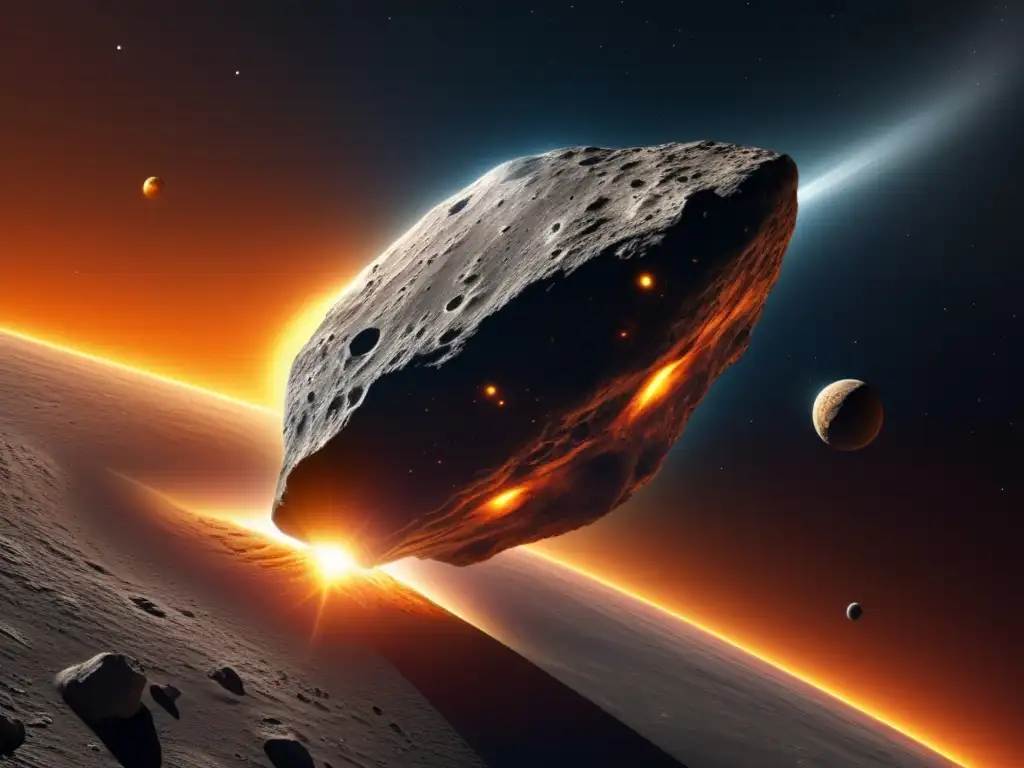Icarus: The Asteroid That Flies Close To The Sun

Introduction
Asteroids have fascinated humans for centuries. These small, rocky bodies can tell us a lot about the formation of our solar system and provide important clues about our planet's past. One asteroid, in particular, has captured the imaginations of scientists and space enthusiasts alike. Icarus, named after the Greek mythological character who flew too close to the sun, is an asteroid that has a highly eccentric orbit and flies very close to the sun. In this article, we will explore the history and discovery of Icarus, as well as its significance to our understanding of asteroids and the solar system.
The Discovery of Icarus

The Early Observations
Icarus was first discovered on June 22, 1949, by Walter Baade, an astronomer at the Mount Wilson Observatory in California. Baade was studying the outer regions of the solar system when he noticed a fast-moving star-like object that seemed to be in the wrong part of the sky. After studying its path, he realized that it was an asteroid with a highly eccentric orbit that brought it close to the sun. He named it Icarus after the Greek mythological character who flew too close to the sun and had his wings melt.
The Confirmation
It wasn't until 1968 that Icarus was observed again, this time by James Christy and Robert Harrington using the Palomar Observatory in California. They confirmed Baade's discovery and determined that Icarus has a highly elliptical orbit that brings it within 28 million miles of the sun. This is closer than any other known asteroid.
The Significance
The discovery of Icarus was significant because it challenged previous assumptions about the limits of the solar system. Icarus's extreme orbit showed that there could be objects in our solar system that behave in unexpected ways and that our understanding of the solar system was far from complete.
The Orbit of Icarus

The Eccentricity of Icarus's Orbit
Icarus's orbit is one of the most eccentric in our solar system. Its closest distance to the sun is only 28 million miles, while its farthest distance is over 220 million miles. This means that Icarus travels from almost as close to the sun as Mercury to farther out than Mars.
The Stability of Icarus's Orbit
Despite its highly eccentric orbit, Icarus's orbit is surprisingly stable. This is because of a phenomenon called gravitational resonance, in which the gravitational pull of the sun and Jupiter cancel each other out. This keeps Icarus in its current orbit and prevents it from being ejected from the solar system or colliding with another planet or asteroid.
The Exploration of Icarus
Icarus has not yet been explored by a spacecraft, but NASA has plans to launch a mission to study it in the mid-2030s. This mission, called the Icarus Flyby, will use a spacecraft to flyby Icarus and study its surface and composition.
The Importance of Icarus

Icarus's Role in Understanding the Solar System
Icarus's highly eccentric orbit provides important clues about the formation and evolution of our solar system. It shows that there are objects in our solar system that behave in unexpected ways and that our understanding of the solar system is far from complete. Studying Icarus can help us better understand how our solar system formed and the processes that shaped it.
Icarus's Potential as a Resource
In addition to its scientific importance, Icarus also has potential as a resource for future space exploration. It is believed to contain valuable metals such as gold and platinum, which could be mined and used in future space missions.
Icarus's Importance to Space Safety
Icarus's extreme orbit also puts it in a unique position to potentially collide with Earth. While this is unlikely, it is important to study and understand the orbits of objects like Icarus in order to develop strategies to prevent collisions with our planet.
Frequently Asked Questions

-
What is Icarus?
Icarus is an asteroid named after the Greek mythological character who flew too close to the sun. It has a highly eccentric orbit that brings it closer to the sun than any other known asteroid.
-
When was Icarus discovered?
Icarus was first discovered on June 22, 1949, by Walter Baade at the Mount Wilson Observatory in California.
-
What is the significance of Icarus?
Icarus's extreme orbit challenged previous assumptions about the limits of the solar system and provided important clues about the formation and evolution of our solar system. It also has potential as a resource for future space exploration and could collide with Earth, making it important to study and understand its orbit.
-
Has Icarus been explored by a spacecraft?
No, Icarus has not yet been explored by a spacecraft, but NASA has plans to launch a mission to study it in the mid-2030s.
-
What is the Icarus Flyby mission?
The Icarus Flyby mission is a mission planned by NASA to use a spacecraft to flyby Icarus and study its surface and composition.
Conclusion
Icarus is an asteroid that has captured the imaginations of scientists and space enthusiasts alike. Its highly eccentric orbit and close proximity to the sun provide important clues about the formation and evolution of our solar system. While Icarus has not yet been explored by a spacecraft, NASA has plans to study it in the mid-2030s. Additionally, Icarus has potential as a resource for future space exploration and serves as a reminder of the importance of studying and understanding the orbits of objects in our solar system. We hope this article has helped you better understand Icarus and its significance to the study of asteroids and the solar system.
Thank you for reading this article on www.asteroidrealm.com. We encourage you to share your thoughts in the comments section and to positively interact with our site by subscribing, sharing this article on social networks, or other forms of participation. For more information on asteroids, please visit our additional resources section below.
Additional Resources

- NASA: Asteroids and Comets
- NASA Solar System Exploration Research Virtual Institute
- European Space Agency: Asteroid Missions
 Discovery And Exploration Of 433 Eros: The Near-Earth Asteroid
Discovery And Exploration Of 433 Eros: The Near-Earth Asteroid The Discovery And Study Of 101955 Bennu
The Discovery And Study Of 101955 Bennu Albert: The Lost And Found Asteroid
Albert: The Lost And Found AsteroidIf you want to discover more articles similar to Icarus: The Asteroid That Flies Close To The Sun, you can visit the Asteroid Discoveries category.
Leave a Reply

Articulos relacionados: